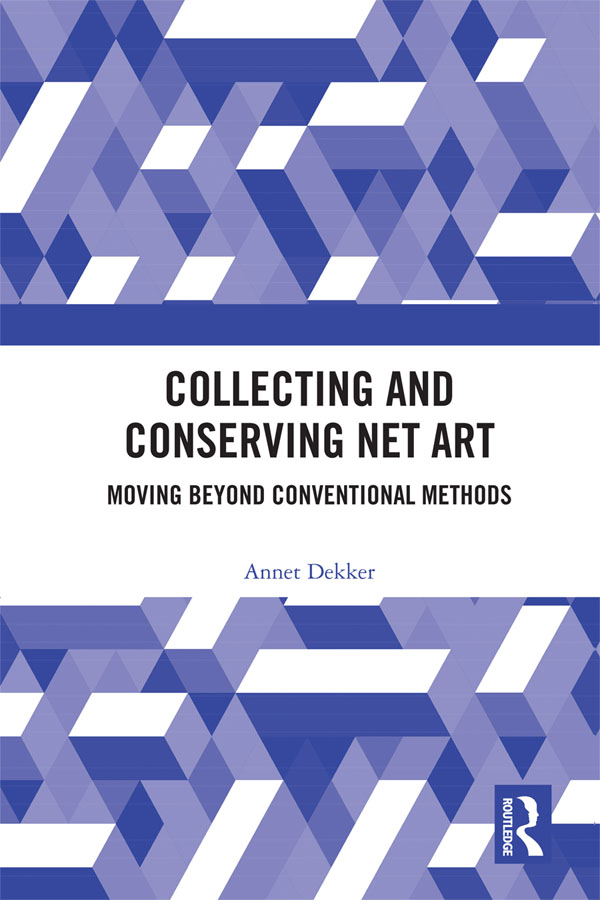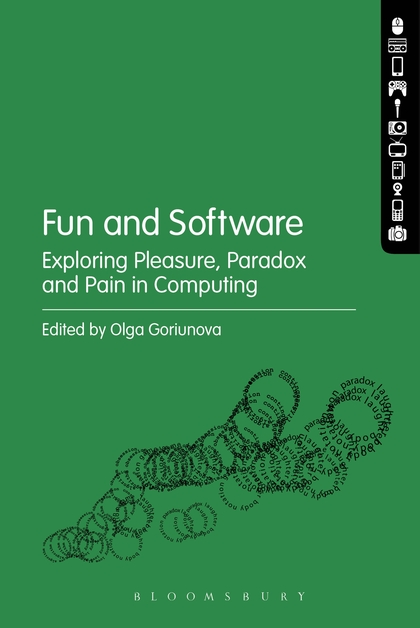Annet Dekker: Collecting and Conserving Net Art: Moving beyond Conventional Methods (2018)
Filed under book | Tags: · archive, archiving, art documentation, conservation, document, internet art, net art, networks, preservation, software, software art, web

“Collecting and Conserving Net Art explores the qualities and characteristics of net art and its influence on conservation practices. By addressing and answering some of the challenges facing net art and providing an exploration of its intersection with conservation, the book casts a new light on net art, conservation, curating and museum studies.
Viewing net art as a process rather than as a fixed object, the book considers how this is influenced by and executed through other systems and users. Arguing that these processes and networks are imbued with ambiguity, the book suggests that this is strategically used to create suspense, obfuscate existing systems and disrupt power structures. The rapid obsolescence of hardware and software, the existence of many net artworks within restricted platforms and the fact that artworks often act as assemblages that change or mutate, make net art a challenging case for conservation. Taking the performative and interpretive roles conservators play into account, the book demonstrates how practitioners can make more informed decisions when responding to, critically analyzing or working with net art, particularly software-based processes.
Collecting and Conserving Net Art is intended for researchers, academics and postgraduate students, especially those engaged in the study of museum studies, conservation and heritage studies, curatorial studies, digital art and art history. The book should also be interesting to professionals who are involved in the conservation and curation of digital arts, performance, media and software.”
Publisher Routledge, 2018
ISBN 9780815382416, 0815382413
x+192 pages
Olga Goriunova (ed.): Fun and Software: Exploring Pleasure, Paradox and Pain in Computing (2014)
Filed under book | Tags: · abstraction, aesthetics, affect, algorithm, art, body, code, computing, game, humour, labour, logic, media, media theory, politics, programming, software, software art, software studies, theory, time

“Fun and Software offers the untold story of fun as constitutive of the culture and aesthetics of computing. Fun in computing is a mode of thinking, making and experiencing. It invokes and convolutes the question of rationalism and logical reason, addresses the sensibilities and experience of computation and attests to its creative drives. By exploring topics as diverse as the pleasure and pain of the programmer, geek wit, affects of play and coding as a bodily pursuit of the unique in recursive structures, Fun and Software helps construct a different point of entry to the understanding of software as culture. Fun is a form of production that touches on the foundations of formal logic and precise notation as well as rhetoric, exhibiting connections between computing and paradox, politics and aesthetics. From the formation of the discipline of programming as an outgrowth of pure mathematics to its manifestation in contemporary and contradictory forms such as gaming, data analysis and art, fun is a powerful force that continues to shape our life with software as it becomes the key mechanism of contemporary society.”
Texts by Andrew Goffey, Simon Yuill, Matthew Fuller, Luciana Parisi and M. Beatrice Fazi, Adrian Mackenzie, Michael Murtaugh, Geoff Cox and Alex McLean, Wendy Hui Kyong Chun and Andrew Lison, Christian Ulrik Andersen, Brigitte Kaltenbacher, Annet Dekker, and Olga Goriunova.
Publisher Bloomsbury, New York and London, 2014
New Media and Technology series
ISBN 1623560942, 9781623560942
285 pages
Software studies page on Monoskop
Comment (0)Olga Goriunova (ed.): Readme 100: Temporary Software Art Factory (2006)
Filed under book, catalogue | Tags: · art, market, software, software art, software studies

“This book discusses projects and research completed in the framework of the Readme 100 Temporary Software Art Factory, which took place in Dortmund in November 2005 and was co-organized by Hartware MedienKunstVerein.
It deals with the topic of production as it relates to software, software art and software cultures. Thus, it focuses not only on software as a product itself, but also on the experiment of its production through methods including outsourcing, use of open source solutions and self-production. Topics addressed include economies of arts, desire and openness, harmony of markets, the unmarketable, reverse outsourcing, resistant mapping and others.
The result is a multi-faceted collection of project descriptions, illustrations, research texts and features relating to the theme of software art production.”
Authors include: Amy Alexander, Inke Arns, Christophe Bruno, Javier Candeira, Yves Degoyon, Elpueblodechina, Olga Goriunova, Francis Hunger, Sven Konig, Eric Londaits, Alessandro Ludovico, Ilia Malinovsky, Alex McLean, Special guest, Julian Rohrhuber, Alexei Shulgin, Leonardo Solaas, Mitchell Whitelaw, Renate Wieser.
Publisher Hartware MedienKunstVerein, Dortmund, 2006
ISBN 3833443693
168 pages
PDF (updated on 2016-12-23)
Comment (0)
